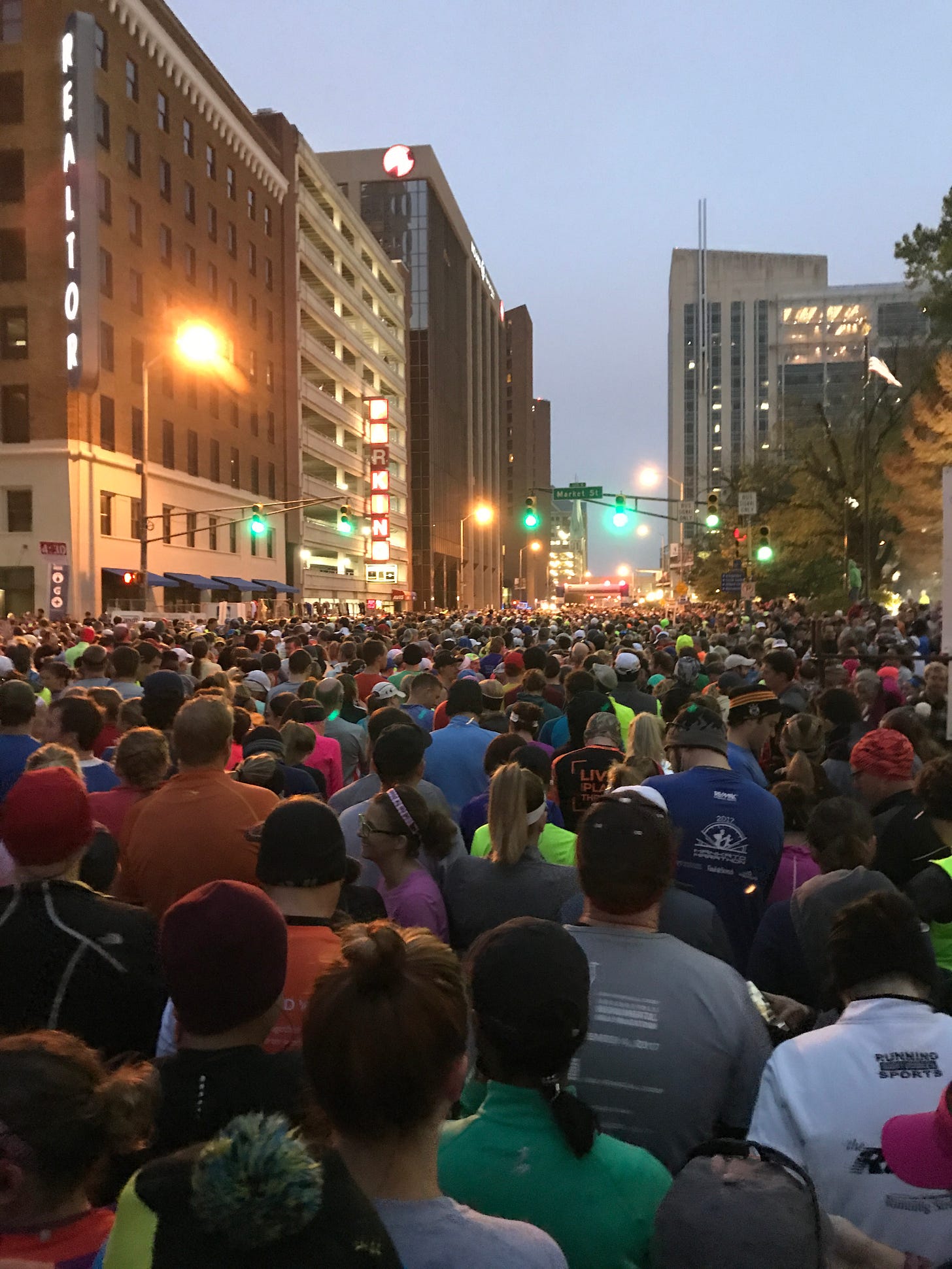Whatever it is, this will not solve it.
It won’t change the fundamentals. That’s not a reason not to do it, but it’s a warning up front. If you set out to do it, you’re probably the kind of person who constantly needs to prove something to yourself, and when you finish, you’ll still be that same person. You’ll still have something to prove.
That can’t be the reason to run, but it’s always been the reason I ran.
oh god no it’s another personal essay about running
I’m afraid you’ll find that the doors have all been locked from the outside. You’re trapped in here with me. Now, as I was saying—
When I elected to run a marathon for the first time, I knew it was going to change everything. I had been unathletic my whole life, an overweight child who wouldn’t run the mile in gym class, let alone twenty-six of my own accord. I’d taken up running as a means to an end several years prior — shedding nearly 50 pounds in my first semester away from school on an internship where I probably developed a mild eating disorder that took me a few years to recover from. The marathon was going to be proof that I’d changed for real, that I was a different person than the one who bought the suit hanging in my closet that was now too big to take in.
I trained more or less in secret, because I loathe putting myself out there in a way that could invite failure. I barely told anyone until I was months deep into training, save for one close friend who’d committed to run the race with me. This was a sneak attack on who I was. I’d chosen Jacksonville, Florida in December, a scenic trip worthy of a disappointed Big Ten team’s bowl journey, for three entirely prosaic reasons: it was during a grad-school break, it was probably going to be cool weather, and the course was probably going to be flat. I wasn’t going to make this any harder than it needed to be.

If you’ve trained right, the first twenty or so miles of a marathon feel like an amazing testament to planning and incremental improvement. No matter how well you’ve trained, though, the next six are about the loneliest place you can experience. Whether you’re on a sleepy residential side street in Jacksonville or on a mobbed Fifth Avenue entering Central Park, it’s only you and your own problems, and the predicament you’ve put yourself in begins to feel incredibly stupid. The nagging doubts practically yell over each other: I didn’t train enough.I wasn’t up to this after all. I’m not going to make my goal time. I’m going to walk across the finish line. I’m going to crawl across it.
Well, I finished. The race was small enough that it ended at a high school track, and a timing chip sensor allowed an announcer to call out each runner’s name as they entered the small stadium. Despite walking a good portion of the previous six miles, I’ve never run as hard as I did when “Scott Hines, from Westerville, Ohio!” came out of that public-address system. I passed six people in the last 400 meters. I finished in a time that wasn’t quite what I’d intended, but was plenty respectable for someone who runs with all the grace and fluidity of a three-wheeled shopping cart full of pumpkins, and I got a damned medal for it. I had faced down a challenge that would’ve seemed impossible to me ten years earlier, and through hard work and dedication I achieved it. So, that changed everything, right?
It did, until it didn’t. I ran well for a while, and then I got bored or busy or made some other excuse, and I stopped. A few years later, having fallen out of shape, I had to prove that I could do it again, so I did. I trained poorly, and finished in a considerably worse amount of time. The next year, I did it again, and I did even worse than that.
Most personal essays about running seem to focus on the change; on learning something from the challenge and emerging from the other side a different person. Just this morning on the radio, I listened to a story about a woman who’d challenged herself to run thousands of miles across Australia, because “I wanted to become somebody more than I thought I could be.”
Perhaps I learned something too, but what I thought that was the first time and what I think it is fifteen years later aren’t the same. A dogged, maniacal focus on a singular goal — on the notion that everything’s going to change when I cross that finish line — left me in cycles of satisfaction and self-flagellation, stuck on a treadmill of hedonic adaptation. Sure, I finished a marathon, but I could’ve done better. Sure, but that was three years ago. But. But. But. The thing is, there’s only one actual finish line in life, and generally speaking, the people who train for marathons are desperately trying to push themselves further away from it.
I began feeling my age in earnest in the past year. I know that’s comical to anyone older than me. I’m thirty-seven years old. With luck, I’ve got plenty of time ahead of me. Still, there’s a point for anyone when that feeling first truly sets in, and I’m feeling it. Whether it’s mid-career ennui, middle-aged weight gain, the demands of parenting two small children, or perhaps just apathy, it’s something. I’m not in anywhere near the shape I was in two years ago, when I ran a marathon (my fifth! — this one was to prove I could do one in my mid-30s after becoming a parent!). I’m sore a lot. Sometimes the first thing I say when I wake up in the morning is “ah, fuck”.
I feel the pull of that old reflex again. Maybe I’ll sign up for a marathon. Prove to myself that I can still do it. It’s harder than it was when I was in college, with few obligations. I can rise before dawn and run before the kids wake up demanding cereal. I can squeeze in time on lunch hours, long runs in between weekend housework and family duties. It’s not easy, but it can be done. There’s nothing to prove, though, other than that I’ve actually learned something from it all.
The woman who ran across Australia? The NPR story omitted a detail, which is that she’d already run across the United States ten years ago, something all but the tiniest fraction of people would consider an achievement far beyond the point of needing to prove anything. Focus on chasing a finish line, and only a finish line — whether it’s a line on the road, a professional achievement, or getting 1,000 subscribers on an email newsletter (cough) obscures the chase itself, which is everything.
Fighting for that finish line ignores the joy of movement, the feeling of blasting anxieties and worries out of my system like lint from a clogged dryer vent. The early morning obligations turning into welcome moments of calm, the sunrises creeping in after months of hiding away. Maybe I will run another marathon soon. Maybe I’ll recognize that I don’t have to prove to myself what I’m capable of.
Maybe this time I can just prove that I know to enjoy the view.

Photograph taken during the 2009 Vermont City Marathon in Burlington, my single worst race performance, a solid personal achievement that I made myself mad about for years.
— Scott Hines (@actioncookbook)
Thanks for reading The Action Cookbook Newsletter, and for gamely enduring yet another personal essay. We’ll be back on Friday with A Good Day In Hell, the recommendation-packed lifestyle guide, with tips on food, drink, entertainment and more — and this one will be the pre-Thanksgiving mega-edition, so don’t miss it.
If you’re enjoying the newsletter, please share (and subscribe if you’re not already!) I appreciate your time and support, and look forward to bringing you more and better things as we move forward.


